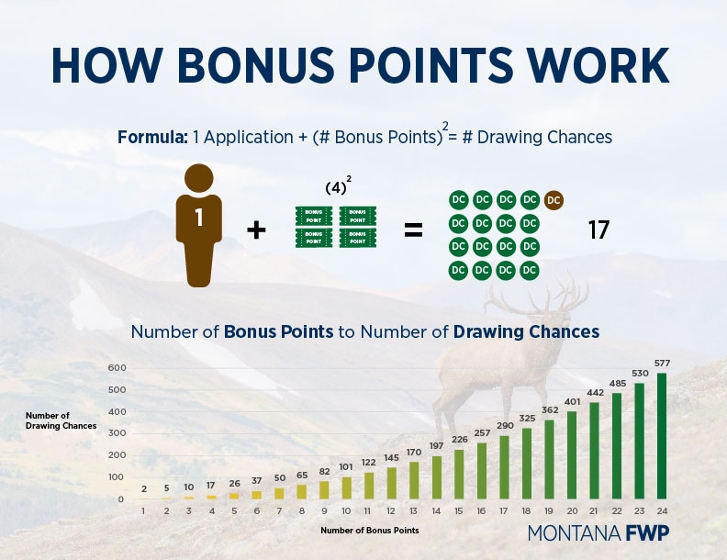The Bonus Point Formula
A unique aspect of Montana’s system is that bonus points are squared before the drawing. The number of “raffle tickets” one receives in the drawing increases exponentially with the number of bonus points a person has.

In Montana every hunter who applies for a license or permit gets one chance in the drawing. Bonus points let you add to those chances. Think of bonus points as extra raffle tickets. If you apply for a license or permit without any bonus points, you get one “raffle ticket.” The number of “raffle tickets” you have in the drawing goes up with the number of bonus points you have.
A unique feature about Montana’s system is that we square bonus points prior to drawing. So, the more bonus points you have, the number of “raffle tickets” you have in the drawing goes up exponentially. For instance, if you have 10 bonus points, you get 101 “raffle tickets” for the drawing – 100 for your squared bonus points and 1 for your current application: (10 x 10) + 1.
Bonus points accumulate until you are successful in the drawing.
Learn more about how bonus points work.
See how bonus points affect your chances.
A unique aspect of Montana’s system is that bonus points are squared before the drawing. The number of “raffle tickets” one receives in the drawing increases exponentially with the number of bonus points a person has.

Preference points prioritize a nonresident combination license applicant with more preference points over an applicant who holds fewer preference points.
75% of nonresident combination licenses are awarded to applicants in the order of which applicants have purchased the greatest number of preference points. The other 25% are awarded to applicants who have not purchased any preference points via random drawing.
Depending on how many applicants purchase preference points, the draw odds for applicants with zero preference points may be higher or lower than the draw odds for applicants who have purchased preference points. It is your responsibility as an applicant to review drawing statistics from prior years and make the best decision for your particular situation.
All accumulated preference points, including any purchased at the time of application, will be used in the current year’s drawing whether you purchase a preference point or not.
Accumulated preference points will be used during the current drawing whether you purchase an additional preference point or not.
Any accumulated preference points are lost if the applicant does not apply for a nonresident combination license in consecutive years, or if you are successful at obtaining a combination license.
Outfitter clients are eligible to purchase second preference point for an additional $100 at the time of application. Licenses issued using this point are only valid for hunting with an outfitter.
No one may hold more than 3 preference points.
Those who do not apply for a combination license may purchase one preference point for $100 over the counter from July 1 through December 31.
Preference points for party applications are the average of their individual preference points rounded to the third decimal point.”
Up to 5 applicants may apply as a party. FWP shall use an average of the number of preference points accumulated by those applicants to determine the party's preference points. FWP shall consider any fraction that result from the calculation of an average when determining that priority.
Learn what Bonus Points and Preference Points are, how they work, what permits they apply towards and more! All from Montana FWP's licensing Business Analyst, Payton Schild.
